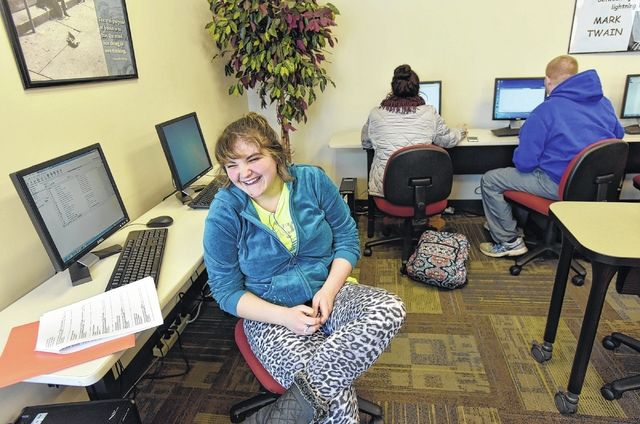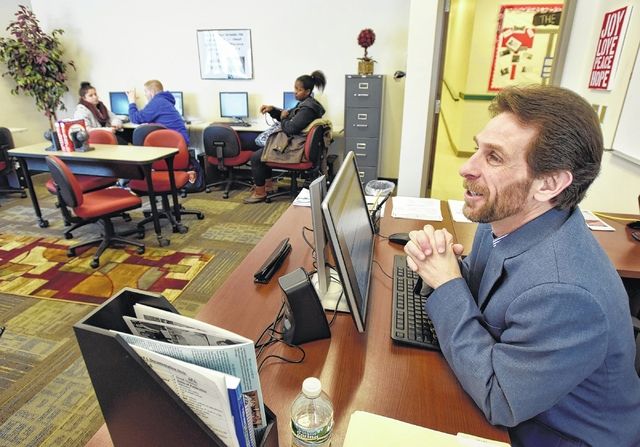Click here to subscribe today or Login.
NANTICOKE — Alexander Kane admitted he came to college not knowing how to construct a compound sentence — a flaw he blamed, BTW, on growing up in the world of texting/tweeting shorthand.
Unsolicited, Bethany Ascenzi — who said her big problem in writing college papers is getting started — admitted, “I don’t tweet.”
Heather Reed looked up from her smartphone long enough to inject obvious irony: “And here I am, tweeting.”
Ironic, because all three were in the Luzerne County Community College “Writing Center,” where students — and soon, anyone — can come for free advice on how to do their class writing assignments correctly, avoiding the growing problem of bringing social media habits to term papers.
“I actually have students writing ‘u’,” LCCC English Department Chair Mary Stchur said with a grimace. “I mean, please, I only need two more letters!”
The news here isn’t the writing center; that’s been around and growing since the spring of 2013 when it was launched as an online opportunity. A physical space with computers, staff and operating hours opened a year later.
The news — set for official unveiling Feb. 19 — is that the center will be made available to the public, free of charge.
So dust off that desk-drawer novel, snatch that screenplay from the shelf, and come on in for an award-caliber rewrite. Right?
Not so much, Stchur stressed.
For starters, a typical session with a reviewer — usually a faculty member — lasts 15 minutes or so; not enough time to go over your lovingly-crafted competition for War and Peace or Gone With The Wind.
More importantly, the center doesn’t do rewrites or remediation. “We don’t tutor,” Stchur pointed out. “We will not write papers.”
Other “will nots” spelled out in the writing center’s flyer: The reviewers won’t ghostwrite, won’t verify content, won’t edit for publication and won’t contest a grade received for a paper.
Even so, Kane said he has benefited tremendously from using the center — and not just because instructors occasionally give a few bonus points on an assignment if students use the place to polish prose.
“I have problems with commas,” Kane confessed. You know — as in difficulty with a punctuation mark used commonly in constructing compound sentences.
Kane and Ascenzi both agreed the center is a big help in making sure you use the right style for each paper. Different formats, particularly in citations, are routinely required for different classes.
So they get assistance mastering the formats for MLA (Modern Language Arts), APA (American Psychological Association, AP (Associated Press) and Chicago Style — which in this case has nothing to do with deep-dish pizza.
Other issues for which the center offers help: Examining the manuscript for format and documentation, make sure it’s on topic and focused, aid in developing and stating the thesis.
Oh, and making smooth transitions from, say, a list of services provided to testimonies of the success accomplished through said list.
Kane, Ascenzi and Reed all concurred that grades grow when the writing center is involved.
“It improves my scores five or six points,” Kane crowed.
Reed said papers she brings to the center come back with “hardly any red marks. Papers I do completely by myself have red marks all over.”
The center, located in Building 9 on the LCCC campus, moved to the more prominent — and thanks to large panes of glass on an outside wall, more airy — room 903, but Stchur said the old space is kept in reserve “as an auxiliary room.”
Which could come in handy once the center is open to the public. Begun with some federal funds and sustained with campus money, the center had more than 200 visitors in the fall semester last year and another 52 using the online service, Stchur said.
So who in the general public is most likely to benefit from the soon-to-be-granted access?
“We could help high school students,” Stchur speculated, “or people who just have to fill out forms or writing assignments, or people in careers who need to do PowerPoint presentations.”
Center Director Stephen Housenick then demonstrated a willingness to even help in penning puns: “We tell people you’ve come to the write place.”
Wait for it.
“Over there,” he adds — pointing out the door and down the hall — “that’s the wrong place.”







